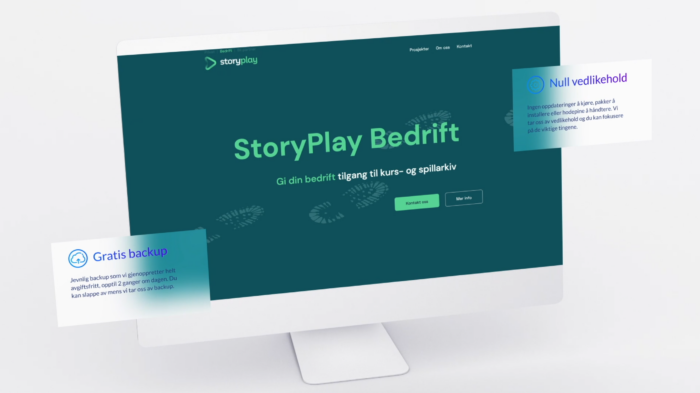We interviewed Joe-Helge from Storyplay and Richard from Webcrafters to get them share insights about automating sales, ticketing, and player experience to games built with Loquiz.
Create games, self-guided and audio tours, team building events and educational content that captures peoples' attention.
Start for freeTranscript
Hello! I’m here today with Joe-Helge and Richard. Joe-Helge is a founder of Storyplay and Richard is a founder of Webcrafters company, so hello, nice to meet you both!
Nice to meet you!
So we are going to talk a bit about what you have collaborated together. So for starters, Joe can you briefly tell what is Storyplay and what kind of games you offer?
Well, Storyplay it’s we have to, we tried to create a name that kind of told people what we’re doing. We are telling stories or we are playing stories, so we’re using, we’re using real stories and we create games based on the storylines that we know from different parts of the historic line that we yeah basically from 100 years back and until now. There’s a lot of cool history that has been taking place, first of all in Norway but we have also stories around in Europe that are quite interesting to create games around the topics. So um, what we have discovered by working with this idea for a couple of years is that cities and populations and societies and how people connect and work together it’s quite the same way of doing that now as it was for like 100 years ago. It’s all about taking choices, it’s all about facing dilemmas and choosing whether to go left or right in different, when you are facing different challenges.
So we thought about, okay how can we tell stories, how can we create stories and use stories as, partially as an entertainment segment. How can we use it as a teaching concept? How can we try to make the stories that we know more exciting for more people. And at the time that this idea started to grow I already knew Loquiz so quite early in this process I thought about how can Loquiz, who is a game creator platform, be used to describe and create these dilemmas that I know and how can we create like different solutions based on different answering alternatives.
So the basic idea is to try to tell stories, real stories, in an exciting and interesting way.
Like an extra question, how are these games played and who are the games target group or who are the games suited for?
It’s depending on kind of what kind of games or what kind of stories you want to tell because we can have a city game, city race, an ordinary treasure hunt in Oslo for instance that can be played as a family game, it’s suitable for kids down to maybe seven or eight years that can handle a cell phone or a tablet. Up to more advanced games meant for a group of leaders maybe in a big company that needs to be challenged on a company-based structural questions.
So we don’t have this like, this is for kids between 10 and 15 or it’s like TikTok or other social media features. We can create games for everybody who’s capable of handling a cell phone and as we know they are maybe 5 years old and up to maybe 90. Okay, thank you!
But to Richard, what Webcrafters specializes in and does for companies like Storyplay?
Yeah, so basically we specialize in digital web solutions, so basically everything that’s got to do with the web. And we use or we tend to specialize in and have competence within modern technology and the reason why we do that is because we want to make it as easy as possible for the client to maintain it and also for them to not like have any hassles with running it over time.
And that’s basically why we are created, so we basically are different crafters within this company using modern technology to make it as simple as possible for the clients and therefore we met Storyplay who wanted to sell games online, they wanted to sell games without doing very much themselves and running the whole process. So basically what we have done for them is we set up a new API platform which basically makes it possible to create different scenarios, so when someone buys a game within the webshop what will happen, we will then send them the login information and they will start playing. When they stop playing, maybe we’ll want to send them a diploma of some sort using some user information from them, so you can see like “Congratulations!” and your name on the name of the player and it will seem very personal.
And all of this is automated and everything is basically, there’s no hassle for the client which is in this case Storyplay to keep this running over time and it’s basically just sell as much as possible and it will all happen automatically. And that’s kind of what we specialize in.
Okay, Thank you! But before you can sell the games you have to build them so Joe-Helge going back bit in time, why you decided to create the games with Loquiz?
Well I’ve been working with Loquiz now for I don’t know the exact date but let’s say more or less three years at least. And i’ve been working quite intense with the guys in Loquiz in the community, in the Loquiz family, so I know the platform quite well and I know that it’s possible to create games that can be like step by step, like a easy quiz mode build game, from that up to high complex games where you can have everybody starts at one place but based on what you’re answering you will have different roads to and to end up where you want people to end up. Like you have different paths or you can have different kinds of like penalties or additional questions if you choose to to go like the bumpy road, if you’re having, yeah based on kind of game you’re playing. But I think that Loquiz is quite easy for me as a completely idiot about this IT structure. I don’t know anything about programming HTML coding or how to connect APIs, I don’t know anything about it, I just know how I want things to work.
And as I know Loquiz it was also important for me that they can provide us with the necessary API connections so we could create like Richard said e-commerce based kind of web shop where you can buy games online from wherever you are around the world and you will receive the password and log in information, you will pay in the same solution and we can also provide the players with different kinds of cool stuff that we think they need like diplomas, vouchers, we can have them take part in a lottery, we can redirect them to a company merchandise shop with a discount voucher.
Yeah, the list is endless and that gives us the possibility to have a whole lot of fun so as soon as I discovered that possibility beacuse the key is the API solution that the Loquiz has created and the next key is in Richard, in his guys, and how to understand, how to connect those two together, that was crucial and that you know it’s proven that it is working absolutely fantastic. So as you said that the next step when the games were ready, it was to set it all up.
Richard how long did it actually take from the starting point where you have introduced the idea and you had to set up the web and all the environment?
Yeah so usually we would say it would take a couple of weeks like but in this case we of course needed to plan how we wanted it to run because no one has had really done it. As long as we were concerned, no one’s ever done it with Loquiz before or at least said they’ve done it and so we had to plan a bit, like how did we want it to work, how was the buyer process gonna be and what happens when we finish the game? Do we want to create some things happening or make some things happen after they finished playing and that took maybe a week or two just to basically find out what do we actually want to do, what do, how do we want the API to perform? And then after that it wasn’t long until we had something ready to try out and then of course we wanted to test it and make sure we were happy with the solution, so in this case it took a bit longer. But we usually tend to say that a couple of weeks from nothing to it being finished is usually what we operate with as long as we know what we want to achieve. But of course after we’ve gotten through that, maybe a month of work and back and forth communication, we had a completely finished solution and now we also have quite a few ideas on how we can use it further and also um and what we can do for like if we start from the base again and what we can do then, what possibilities are with Loquiz?
I would like to add something because I have spent quite a long time thinking of how do I want this solution to be and I need to say that I spent quite a few hours talking to other developers like big companies and the time line that they estimated was like four times what Richard and his team provided. And I was amazed of the knowledge and the understanding of the whole concept, how that those things, we were just like spot on from from day one and now that we have done the work that we have done, a new game that we, that I create for a client or for the open market will be available in the web shop on my home site within the day. Like if I say to Richard at eight o’clock in the morning that “Okay, let’s do this!”, it will be available the same night.
So all the connections, all the wiring, all the switches and all the things – they are just lying there ready and the API functionality as you know in Loquiz we have, we have yeah I think we have created a room that is fully served and ready for having the starter to be placed on the plate to each and everyone.
But can you imagine if you wouldn’t have this automation and everything set up, how would you handle the sales,
the follow-ups to your customers, can you imagine how many team members you would need?
I’d rather not. That’s why this project has been very important for me and it has, and I know that it’s important for Richard and his team as well because in my opinion if you don’t aim for an automated solution in a way, it doesn’t have to be like this but it has to be, you have to give the clients the possibility to buy games whenever they want to play it, you know. If you’re going to play a game on who’s talking about the Second World War or you’re talking about the
Viking invasion in England or the liberty of the poll or whatever. People prefer to play those games when they can, when they are on holiday, they are traveling, they’re having a school class, whatever. And if they are going to call me, who’s always busy in the phone or in my car, and I will provide them with a username and password, let’s say that can work for a limited amount of players but after they are played, so what? I don’t have any information about the client, I don’t have a name, I don’t have the phone number or email so I don’t have my own CRM that has to be manually built, now I have, I can provide games automatically, they can pay and play whenever they want to do and I, at the same time, will build a client base that I can give offers for the next time I launch a new game in the same category. So to do that manually, I think that I would like to, I would need at least three maybe four people and two of them have to sit permanently back office answering phones and emails and providing people with username and passwords and creating batches and yeah a whole lot of manual work. And those people only work from let’s say 8 to 4 o’clock in the evening, what should we do if people are going to play a game at 8 o’clock in the night? Nobody’s answering the phone okay. Try to create a company now and don’t answer in the phone – you are quite rapidly out of business.
Considering that this automation is the key to everything and Webcrafters connected through API ticketing, about this marketing automation and connecting to the steps the player takes after the purchase. Richard, can you bring some cool examples of automation Storyplay users placed on player actions? Which one
are your own favorites, for example?
Well, what we’ve spent quite a lot of time figuring out for ourselves going into this is how can we make the whole experience more than just actually playing the game and how can like Storyplay be the products in this case?
How can they, yeah, how can the customer feel like they’re getting a Storyplay experience?
And in that sense we’ve gone into making different scenarios so we can listen to different things happening, so
like whenever they end the game, we will know and what do we want to happen and when they end the game. So um for instance, we have like sending like a diploma with a name on it and some information about the game and you can see like graphics and different things and also the text is like written based on how the game is, so you’re like, if you do a soldier game, like an army game, you’ll get like “Congrats comrade and successful soldier!” and you’re recruited and you like build more of a thing around it that doesn’t necessarily happen within the game because you get that, if you want, by a text message or email afterwards. And all of that is basically themed within the game, so you feel like you’re still playing the game even though you’re not within the Loquiz app and so that’s quite cool.
And at the same time we’re also creating solutions and for Storyplay to set up b2b like basically business client panels within their website, where they can have their own courses and host their own games just for their business and everything is basically fitted to them and in the same, like in this instance as well you get the same things but on top of that we have other functionality that we haven’t or we’re working on utilizing, like scoreboard and do you want to give people the ability to compete against each other or extracting media. So if you take pictures and stuff underneath, yeah like as you’re going within a game, you’ll get them sent to you like with a link and like you get the ability to share it to Facebook and all the social media.
And at the same time you can reply back “I don’t want the images, please delete,” and it will automatically be deleted from the website, so everything is completely automated here as well. So we have quite a few cool examples and but we’re still working on expanding on it. Again, I will, I would just like to add something as well because we have created a couple of pages that are company specific and one of the companies, they want to run courses and education for the employees and we can give them like a four-step ladder, where they start on level one and we can also tell the, we can make the score decide whether they are going to fail or pass that specific test. So if they pass, they will get one kind of diploma, if they fail, they will have another message there saying that “Sorry but your score was too low, you have to wait like one week, please try again!”.
And as soon as they reach the diploma maybe the department leader or the manager of the company will also get a copy of that message, so he or she will always know who has been taking what kind of courses and classes. For this particular company, some of the people working there are depending on passing a theory test before they can do a practical test, it’s for boat drivers and it’s automated – the people can take this test whenever they want.
The game is structured and created in a stressful matter, it’s not like a traditional e-learning and it’s basically an escape game, all of these games are based on the same idea – it’s a time limit, you have to face stress, you have to cooperate with others maybe, you have to make decisions and that’s quite common for almost everywhere you’re working, all those factors are important, like time issues, stress issues, you have colleagues that you have to relate to, then you have to make decisions and you have to listen to give advices. So this automatically diplomas, for instance, I think that’s a quite clever idea.
Joe-Helge, what would you say to someone who is still hesitating to set up this kind of combination to create game with Loquiz and then sell them through their own website, how to ease their hesitations?
I’ve talked to a few people already in the Loquiz family and I think the biggest concern they have is that this is too complicated because the people I’m talking to they are sales people, they are running like startup companies and trying to, they are good with people, they don’t like to “Oh really, should I create my own like e-commerce solution?” Well I’m just like that but we have done a lot of the basic work already so I know now, and this has nothing to do actually about Loquiz, but I know now that the process that I’ve been through can be useful for everybody who wants to have the access to all the clients in the world, instead of trying to promote a phone number or an email address that’s like, that’s 10 years old technology.
We don’t do that anymore. People would like to have everything on the cell phone or the tablet, they would play it on the go, they are standing in middle of a city and like, what to do here, okay let’s try this home page that we have been receiving info about. And in that city we have three games and you can just plug and play, it will take them two minutes to be online with a new game and the manager of the company could be sleeping in another part of the world for all I know. The games will be running and hopefully the income will be running
as well. So if anyone have questions, please don’t hesitate to ask me and I will promise to give you all my honest answers.
We will make sure to add your contacts in the link below the video. Yes, please!
But Richard, would you like to add something, where do you see the biggest savings for the clients money or time with the integrations you have set up?
Yeah, well, I think there’s quite a few upsides with doing this. I think it’s good to remember that you can actually, when you go into this type of project, making your whole concept automated, you can actually then, you get that the power of choosing what the buying experience and also the user experience is going to be beforehand. So you can choose exactly how you want the experience to be and what’s going to happen when and you can you can basically like sit down on the drawing board and be, feel like a superhero because you’re in charge. And you do it beforehand and then after you basically just press play and make sure people get to your site and buy the game, but when they do that, then everything happens just as planned.
And when you do make it automated and you have a online shop working in that way, it basically becomes a workhorse and there’s no limits, it basically enables you to think a lot bigger than you would before. You can create different type of products for different countries, you can, and when someone gets the website in Italy, it was shown in the like, in like with all the games, that is basically available in Italy, you can do like anything you want basically. And you can I guess and the whole world will be your playground, if you choose to. And that’s all in your hands, you have to choose what your concept will be and when like, as long as you get people to your site and they buy the game, everything will happen automatically after that.
So that’s I guess, that’s what the whole idea here is and what’s great about it. I’ll just, I would just like to add something to that too, I’m an adult you know. Go ahead!
You can try to imagine – take a country, let’s say Finland. They have a tourist flow in Finland, I don’t know the numbers but there will be several hundreds of thousand people entering Finland each year, arriving by boat or by plane or visiting the thousand lakes or I don’t know.
You can provide all the tourists with a game based on where they are arriving. Let’s say they will come to a boat and land in Helsinki, you can have three games in Helsinki that people has, they have been prepared on the boat on the way over to Helsinki, this is a game for families.
Call it like “Kids and family challenge volume one”. But when you have played it, you can play it on the boat or you can give them a teaser like four questions and you’ll have a voucher that gives you a username and a password that you will be using when you are inside the city.
And then in the city you can have a 40 minutes game, city game, city race game, treasure hunt, and as soon as you are finished with that one, you will receive a universal gift card or a voucher. It gives you like a two for one offer in any restaurant that you can find in that city. And as we know
in these times with corona and
disaster about the tourists, so I think that there will be a lot of visitors
in different countries and cities.
It can also be used as a teaser for
your own local people who wants to visit your city. Tourist games are a good idea in the shops and the restaurants will get people to visit them and they will happen to buy something more than they usually would. So, yeah.
Thank you! Then I have a bonus question for the both of you, if you could say only one thing maximum three sentences to our viewers today to remember from this conversation, what would it be?
Should I start?
Yeah, you start Richard!
Everything is possible.
Very good! Joe-Helge?
Automated is the new manual.
Oh, that’s nice one, thank you!
So again, I’m very happy you’ve both found time to join me in today’s webinar and I hope your summer will continue in a really fine way and you will have lots of interesting games coming up in the future. Also thank you to our viewers and until next videos and next games! Bye!
Bye-Bye!
Related stories

You’re building a self-guided tour, and you’d like to increase the immersion? The music is one of the important aspects...

With your Loquiz game, you can add a list to simply display your tasks. It’s recommended for indoor games or...

The Loquiz creator allows you to have a map… But also a custom visual interface called “Playground“. This feature allows...
Start free trial to bring your ideas to life
Sign up and create games, tours, team events and educational content that captures peoples' attention
Start from the scratch or use templates to kickstart!

